What is present perfect and when do we use that? We use the present perfect for actions that happened in the past with a result in the present time.
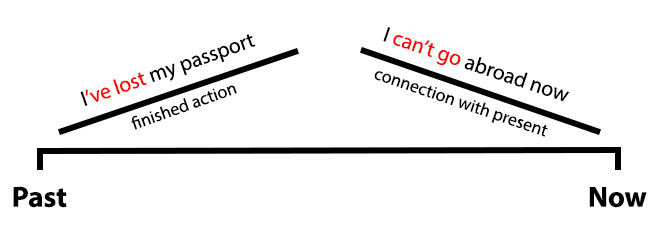
I’ve lost my passport so I can’t go abroad now.
There is a traffic jam here, there has been an accident.
Murderers have killed two men and …
And for the situations that have a connection with the present. The action in the past has a result now.
What did the doctor tell you? Well, I do not remember. I have forgotten about it. (I can not remember it now.)
I can not find my key. Have you seen it? (Do you know where is it now?)
Table of Contents
Forms
The present perfect is “have/has + past participle”. The past participle often ends in _ed (finished, worked, etc.), but most of the verbs are irregular. (Lost/ate/cut etc.)
The structure is like: subject + have/has + past participle
- I/we/they/you》have + finished
- He/she/it 》has + finished
| Subject | Verb |
| I | have gone. |
| You | have gone. |
| He/She/It | has gone. |
| We | have gone. |
| They | have gone. |
Here are some examples of irregular verbs:
| Verb | Past Simple | Past Participle |
| eat | ate | eaten |
| break | broke | broken |
| steal | stole | stolen |
| buy | bought | bought |
| cut | cut | cut |
| shut | shut | shut |
| drink | drank | drunk |
| go | went | gone |
| be | was/were | been |
| have | had | had |
| see | saw | seen |
He has had a stomach ache. (He’s had …)
They have gone to Paris. (They’ve gone …)
The contracted form is:
- I/we/they/you have (=l’ve etc)
- He/she/it (=he’s, etc.)
Questions and negatives
Negatives: to form a negative sentence we need to add “not” after “have/has”.
| Positive | Negative | Contraction |
| I‘ve gone. | I have not gone. | I haven’t gone. |
| You‘ve gone. | You have not gone. | You haven’t gone. |
| He‘s/She‘s/It‘s gone. | He/She/It has not gone. | He/She/It hasn’t gone. |
| We‘ve gone. | We have not gone. | We haven’t gone. |
| They‘ve gone. | They have not gone. | They haven’t gone. |
I have not finished the project yet. (I haven’t … = contracted form of negatives)
She has not washed the clothes. (She hasn’t … = contracted form of negatives)
Questions: to form a Yes/No question we change the place of the subject and “have/has”.
Have/Has + subject + past participle of the verb
| Statement | Question |
| I’ve eaten. | Have I eaten? |
| You’ve eaten. | Have you eaten? |
| He’s/She’s/It’s eaten. | Has he/she/it eaten? |
| We’ve eaten. | Have we eaten? |
| They’ve eaten. | Have they eaten? |
Have you ever eaten sushi?
Has he watched this movie?
Usage
We use the present perfect to talk about unfinished actions. Actions that started in the past and they didn’t finish up to now and have a connection with the present time.
I’ve known her for almost ten years.
We’ve been in New York since 2002.
Note: we do not use specific times with the present perfect.
We’ve studied Chinese. (Not: We’ve studied Chinese last year on July 18th.)
He has been to France in 1990. (Not: he has been to France in 1990 on November 1st on Tuesday.)
Note: When we say something has happened we are thinking about the past and the present at the same time.
Present perfect: thinking about the past and the present at the same time.
I can’t come to the party because I’ve broken my leg.
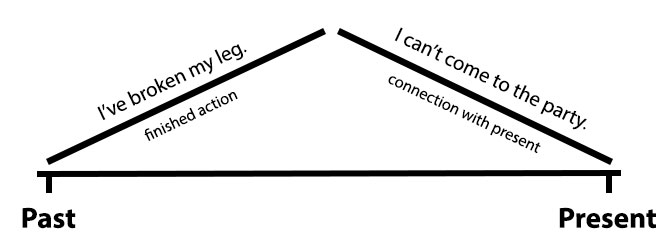
Intermediate points
What is the present perfect tense? We use the present perfect when there is a connection with now. The action in the past has a result now.
Finished times
Pay attention that we just use the past simple with the finished time expressions (yesterday, last week, last month, etc) not the present perfect.
I found my keys yesterday. (Not: I’ve found …)
They went to London last month on Saturday. (Not: they’ve gone …)
New information
Something has happened = usually new information.
Look, she’s cut her hair.
There’s so much traffic. There has been an accident.
[/ex]
Gone (to)/been (to)
She’s on holiday. She has gone to Spain. (=She is there now or on her way there.)
She’s back home now. She has been to Spain. (=She has now come back.)
Just/already/yet
Just: a short time ago.
Has he just left here?
Are you hungry? No, I’ve just had a snack.
Already: something happened sooner than expected.
Do not forget to charge your phone. ‘I’ve already charged it.
What time is she arriving? ‘She’s already arrived.’
Yet: until now. We use yet to say that we are expecting something to happen. It is used only in questions and negative sentences.
Has he stopped smoking yet?
I bought the dress, but I haven’t tried it yet.
For talking about a period that continues until now, we can use these expressions too.
- Recently
- so far
- since
- in the last few days
- etc
Have you heard the news recently?
I’ve talked to him in the last few days.
He’s getting well, he hasn’t had any problems so far.
I feel sleepy, I haven’t slept since last night.
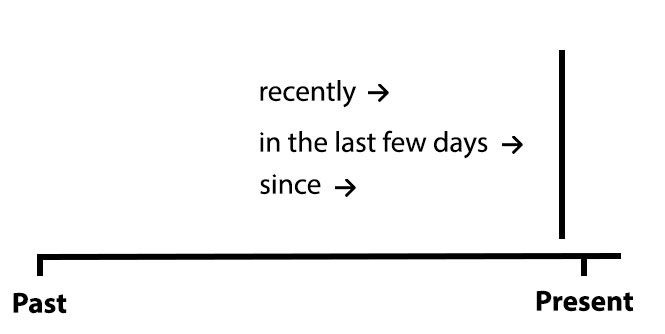
Note: we can also use these expressions (today/this week/this morning/this month/etc) to talk about the periods that are not finished at the time of speaking.
I’ve drunk five cups of tea this morning.
Have you passed your exams this term?
She hasn’t done her homework, have you?
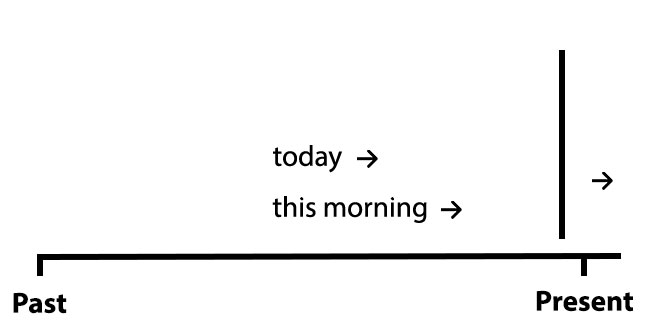
Finished events: news
If we want to announce news of recent events we normally use the present perfect.
My brother has won the lottery.
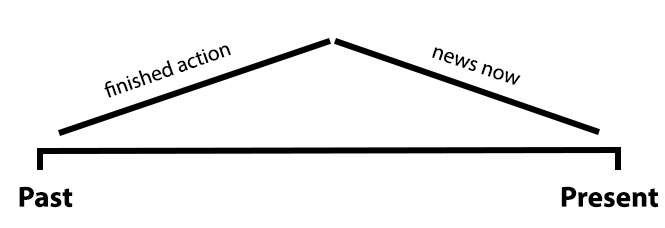
Have you heard the news this morning?
Note: To give more details after announcing the news, we mostly use the past simple.
My brother has won the lottery. He paid a lot to achieve that, but he was hopeful.
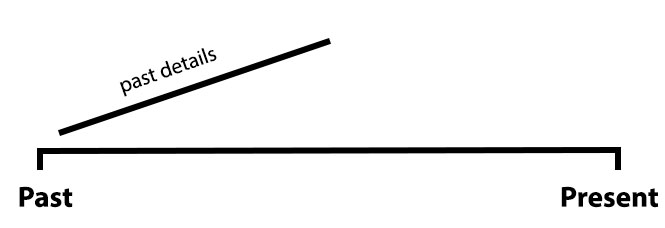
Present perfect for news
Past simple for details:
Something happened several times:
We can use the present perfect to say that something has happened several times up to now.
I’ve written several articles since morning.
Adverbs of frequency
The present perfect is common with the adverbs of frequency. (Always, usually, sometimes, often, never, etc)
I’ve always thought of migrating abroad.
How often has she been to Brazil?
Advanced points
It’s the first time this has happened.
We’re having dinner at a Chinese restaurant. It’s the first time.
It’s the first time I’ve eaten sushi. (not: eat) I’ve never eaten that before.
Expectation and reality
We do not normally use the present perfect to refer to a belief that has just been shown to be true or false, the past tense is used instead.
You are younger than I thought (not: … than I have thought.)
I knew you would do that! (Not: I have known …)
Specific time
The present perfect is not used with expressions referring to (specific time). It means that we do not use the present perfect with finished time expressions, but it is common with definite time expressions.
I’ve lived there for exactly five years. (Present perfect with very definite time expression)
Once upon a time, there was a little prince … (simple past with very indefinite time expression)
Past events with their present result
We usually use the present perfect whenever we’re thinking about past events together with their present results.
He can’t run because he has broken his leg.
My daughter can’t come out tonight, she’s been sick.
Since
In the sentences where we have a time clause with “since”, it is most common to use the past simple in the time clause and the present perfect tense in the main clause.
He hasn’t been able to drive since he broke his leg.
Since my mother immigrated, I’ve been depressed.
Note: We can use the present perfect tense in the time clause under a certain condition.
Those two actions described in the clauses (time clause and main clause) are extended until the present time.
Have you tried any of this cheese since you’ve lived in France?
He’s started his second language since he’s entered the university.
Present perfect refers to future events
Time clauses are introduced by when, until, after, once, as soon as, by the time, and with some time expressions like moment, second, the minute, etc, and the past simple that refers to completed actions and events in the past and the present perfect refers to future events. Take a look at these examples.
After she finished her exams (past), she had a long holiday.
After she has finished her exams (future), she will have a long holiday.
Here was the present perfect tense with all the details for you. We hope it’s useful. If you have questions about this topic, you can leave a comment.
You can also check out the English Grammar page to read other grammatical articles.
